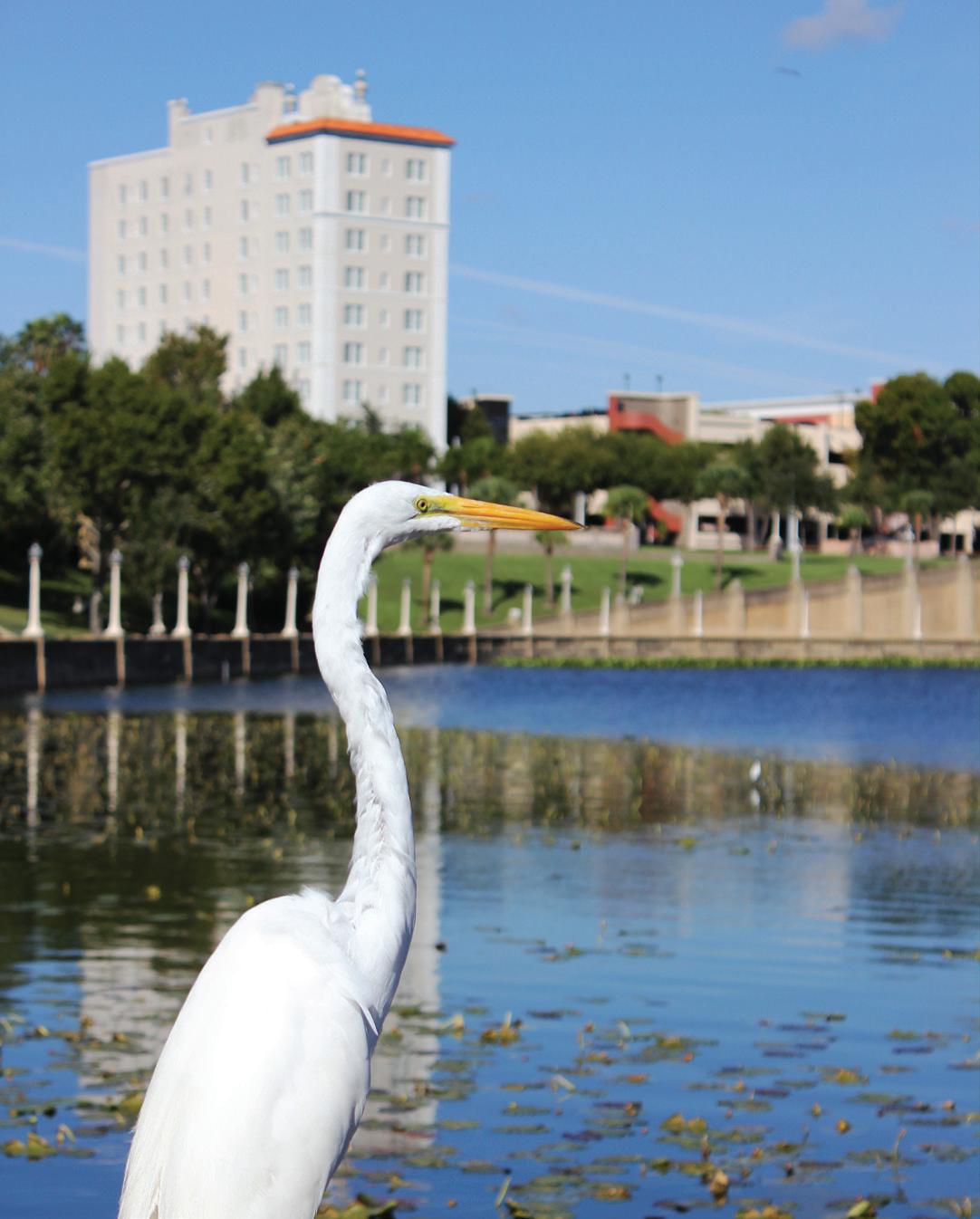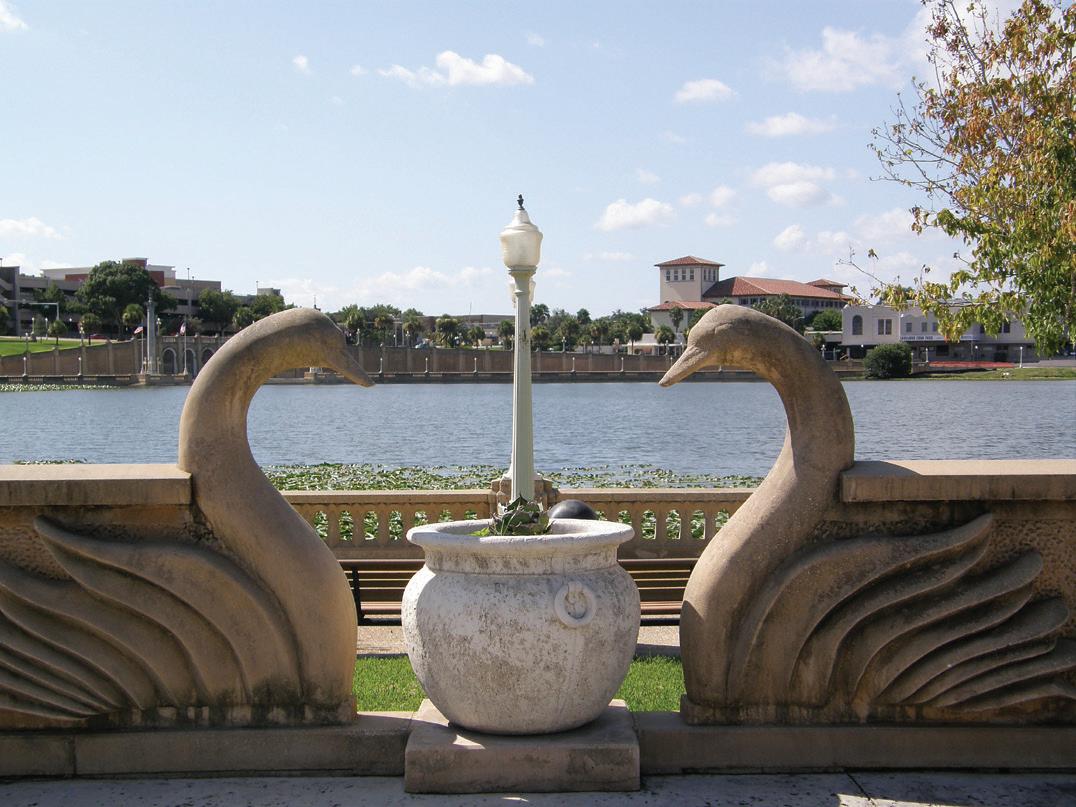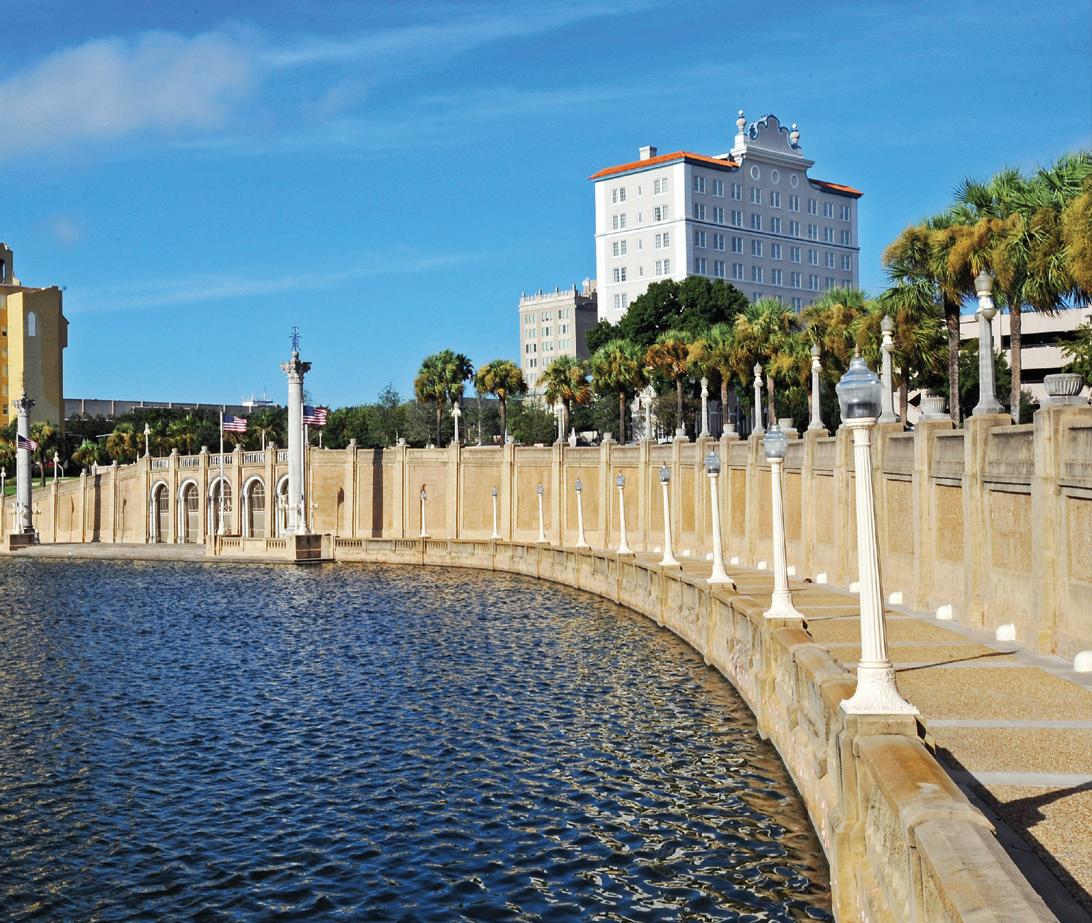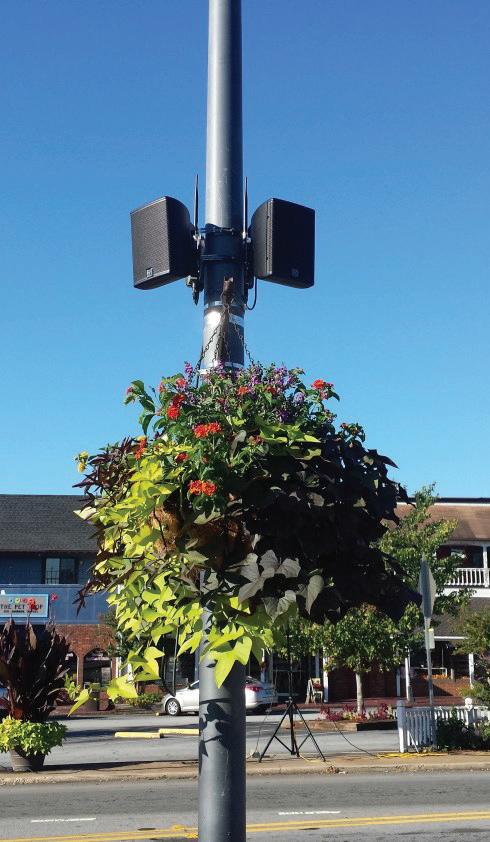
11 minute read
Focus on Crisis
Communicating in
By DENISE FEDOROW | The Municipal
When communities are in crisis, whether it’s a power outage, weather-related disasters or the need for a boil order, getting the information to residents and businesses is critical. With all the communication methods available now, cities and towns have shifted to meet people where they are.
Most municipalities and their departments have Facebook pages and Twitter accounts where they post up-to-date information, but not everyone has social media and even those who do aren’t constantly checking it or are not connected to their municipality’s pages. Therefore, many communities are using a variety of methods— emails, text messages and robocalls — as well as social media to keep their folks in the know.
One community that has enhanced its notification system is Lakeland, Fla. The electric and water utilities in Lakeland have each updated the way they inform customers when something is amiss.
Cathryn Lacy, utilities marketing manager for Lakeland Electric, said the utility has two separate notifications by text message — one for outages and the other for billing and usage. It has been sending outage alerts since 2018 but more recently updated the outage map, which has added more options.
“We’re really pleased, and we’ve gotten great customer feedback,” she said.
The system Lakeland Electric uses is called Notify through Kubra. It’s a fully integrated smart grid system. When a meter goes out of power, Lacy said, “It sends a last gasp to us and immediately goes into the system and goes directly to the call center and the lineman.”
It also generates a text notification. She said the utility notifies customers by email, text and voicemail.
The system also gives status updates regarding the outage, like crews are en route, the reason for the outage and if it’s taking longer than expected for crews to get there or to fix the problem.
Lacy said the utility also sends notices for planned outages, too, like when workers will be trimming trees or doing substation maintenance. Planned outages are sent predominately by email, but customers can choose to be notified by text message.
According to Lacy, it was after Hurricane Irma hit the area in 2017 that Lakeland Electric made the decision to go with this system, and it was implemented in 2018.
“It’s just been a huge success for our customers,” she said.
Lacy shared an anecdote of a speaking engagement she had with a homeowners association community in 2018. She said there had been a power outage in the neighborhood that same day. After her presentation, when she asked if there were any questions, “Every hand went up! I thought, ‘Oh dear.’”
But the residents all wanted to share how they received text messages about their power outage, how it had told them what the problem was and they were so happy about it.
“I never had so many positive comments — customers were in the know,” she said.
Another advantage is for the seasonal residents — aka “snowbirds.” She noted, “We have so many snowbirds here. They own property

The reflection of downtown Lakeland, Fla.’s, skyline is shown on Lake Mirror. (Photo provided by the city of Lakeland, Fla.)
here but are not here all the time. They’ll still get the updates even if they’re out of state.”
The challenge sometimes is keeping current phone numbers so Lakeland Electric just launched a new website that’s easier for users to go in and update their contact information.
On the nonemergency side, Lacy said she was pretty excited about the Apogee billing system, which offers a variety of options for customers to take advantage of. She said customers can go into the system and sign up for email or text notifications to inform them when a new bill is sent, remind them to pay their bill or if they’re set up on auto pay, it’ll tell them when payment is approved or if auto pay expired.
It also informs customers of usage.
“Because we have a smart grid once we have 12 months data, we can tell them when they use more electricity than in the past. Customers can also set limits either on Kilowatt hours or dollar amounts, and if it goes over that limit, it’ll send a text message so customers can make adjustments.”
Lacy said the goal is customers don’t get a big unexpected bill at the end of the month— particularly in the hot summer months when air conditioner usage is up. Customers can know halfway through the billing cycle and determine what the bill will be at the end of the cycle.
“It’s extremely accurate,” she said. “The algorithms combine history and temperature to get a very accurate prediction of what their bill will be at the end of the month.”
Lacy also pointed out with the new outage map the outage alert system was turned into an opt-out program. If the utility had a cellphone number for the customer, they were auto-enrolled into text message alerts. They had to opt out or change to email notifications if that was their preference.
The utility also uses the bill and usage alerts to promote time-of-use demand rates. It informs customers how to save money and be more energy efficient by reducing usage during peak times.
“It’s been a great tool because it’s putting power in their hands,” she said.
While Lakeland Electric has increased notification about the COVID pandemic, its focus was on assistance programs and payment plan options, and that information was transmitted through Wildlife enjoy the view of Lake Mirror with the Lakeland skyline in the background. Lakeland utilities upgraded their notification systems to inform residents in the event of a crisis to the utilities. (Photo provided by the city of Lakeland, Fla.)

Factors to consider about informing the public
Although not specifically about crisis notification, the Environmental Protection Agency offers these factors to consider when deciding how to inform the public: • What existing communication networks are available to share information? • What forms of information are more likely to resonate with the target populations and therefore be more effective? • Are there multiple languages in the community? How will you accommodate those languages? • What is the literacy level of the community? Will they understand the information you’re trying to convey? • Are there types of communication that will not work with the target audiences? • Are there communication vehicles or media outlets considered to be more trustworthy than others that would be good vehicles for sharing information? Source: http://www.epa.gov/international-cooperation/ public-participation-guide-tools-to-inform-public
customers’ bills, the utility’s website and social media, not through the alert system.
The utility can also send out emergency notifications in case of an official emergency, like a hurricane. Lacy said those alerts would depend on the situation but are usually along the lines of messages encouraging customers to be prepared and expect an impact from the storm.
Water utility
The city of Lakeland Water Utility enacted a new notification system April 30. Raymond Hoppenworth, CPM, smart grid systems manager for Lakeland Water Utilities, shared the application the utility is using is called Everbridge Suite.
“At this point, it’s primarily used to notify customers when there are precautionary boil water notices, their related rescission notices and any planned outages.”
Hoppenworth said the system is provided by an international company with a proven track record of delivering such messages across the globe. The new system replaces the previous notification system that required door hangers to be physically placed at each impacted location.
“As you can imagine if one of the events impacted 200-plus locations, hanging those door hangers was time consuming, expensive and slow to distribute important information to our customers,” he said.
A previous story in the press also mentioned the utility also heard complaints from customers who don’t use the front door so they didn’t see the door hanger. Hoppenworth said Everbridge gives them the ability to send notifications out so customers get the information much faster.
“Our crews can now focus on the needed repairs to get the customers back in service quicker,” he said.
The customer will receive multiple notifications in the following order — phone calls first, text messaging second and an email will be the final notification. Customers are asked to acknowledge receipt of the message, and if they don’t, the next method will be used. Once the customer confirms receipt of the notice, the system stops.
Hoppenworth said the response by customers has been mixed but mostly positive.
“By far, most of the comments received have been positive,” he said.
According to Hoppenworth, the negative comments officials have received have been about receiving multiple notifications, which customers could avoid by acknowledging receipt of the notification.
“As with any new process, there’s a learning curve,” Hoppenworth said. “Our goal is to deliver this important information to our customers quicker to keep them updated on any event that may impact their water supply. Everbridge allows us to accomplish this much faster than the previous notification method we were using.”
Boston increases available languages
The city of Boston has had an alert system for several years. In August 2016, its system, AlertBoston through CodeRED, was upgraded. The system alerts residents, businesses and visitors by phone, text or email, and at that time had the capability to deliver alerts in four languages — English, Spanish, French and Chinese— according to the city’s website. Swans have been honored in Lakeland, Fla., and reportedly they’re the city’s mascot. The story is the swans that were found swimming on the lakes had all died off by 1954, and a pair of swans from London, donated by Queen Elizabeth after she heard of the swans’ plight, were shipped to the city. (Photo provided by the city of Lakeland, Fla.)


Pictured is Lakeland, Fla.’s, city hall. Lakeland’s electric and water utilities have implemented text message notification systems to quickly inform residents of power outages and boil orders, for example. (Photo provided by the city of Lakeland, Fla.)
The messages are sent in the event of severe weather, parking bans and street closures, and the upgrade also gave them the option to alert the entire city or just certain impacted areas.
In April 2020, the city increased the text service to include more languages so residents now have the option of 11 languages — English, Spanish, French, Chinese, Haitian Creole, Cabo Verdean Creole, Somali, Arabic, Vietnamese, Russian and Portuguese.
During COVID, text messages began being sent daily with Boston case numbers, local updates about the spread of the virus, preventative measures to mitigate the spread, etc.
The former mayor was quoted as saying it’s important that the critical public health information the city is sharing reaches every resident
in the language they speak, so collectively as a city, residents can be informed about the seriousness of the virus and work together to stop the spread.
Weekly robocalls were also delivered to residents 60 and older, and sound trucks went through the hardest hit neighborhoods.
Residents can fill out a form on the city’s website and choose the language in which they want to receive notifications, and they could also choose additional alerts for things like street occupancy permit alerts and towed car alerts.
Also, according to the website, current Mayor Kim Janey recently used the AlertBoston system to inform and warn residents about a heat emergency.
Up and running
Lacy said Lakeland Electric worked hard to get the system up and communicating with each other — making sure it’s communicating with the customer tool, the asset management tool, etc.
“We worked hard to get that set up and all integrated,” she admitted, but in her opinion, the effort was well worth it.
“I will say it definitely helps during the outage on the call center because customers have proactive messages,” she said. “The customer feedback has been very positive.” The serene Lake Mirror Promenade in downtown Lakeland, Fla., was conceived by Chamber of Commerce President John Appleyard in 1923, and in 1982, it was listed on the National Register of Historic Places. It continues to be the center of community activities. (Photo provided by the city of Lakeland, Fla.)

Having a problem with clogged pipes?
Let’s talk about de-scaling and drain cleaning...
• EXPERIENCE
GI INDUSTRIES has been manufacturing these systems for over twenty three years. • POWERFULL

All of our systems are equipped with high speed/torque motors that only require 9 amps on a 110 V circuit. • VERSATILE
You only need one of our systems for all of your cleaning requirements. (1/2”-24” ID and up to 150’ in length). • UNIQUENESS
The only systems that offer variable speed controls, forward/neutral/reverse rotation and innovative air/water flushing features at the drill/brush head.
• Wireless Speakers. No digging up sidewalks or streets.

• Festivals, parades, special events. • Ambient music for shopping district. • Fully outdoor rated system. • Stream music from internet services.
• Acts as a Public Address audio system. • Play announcements or sponsor ads. • Easily mounts on street light pole.
• Remote volume control of each unit.
• Remote alarm monitoring. • Scheduler for time of day operation. • Very high quality audio.











